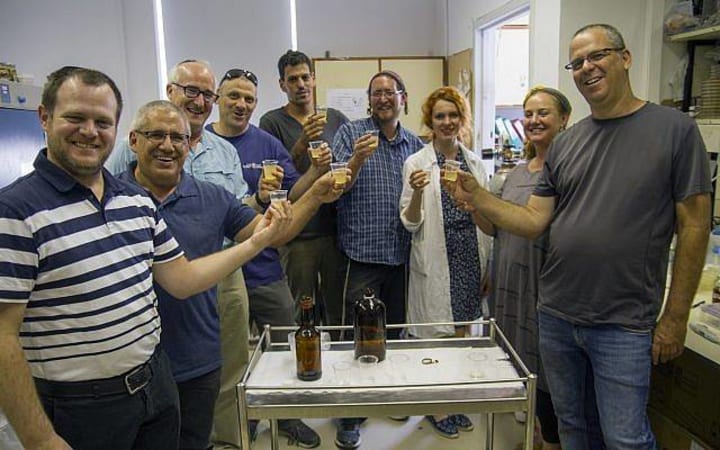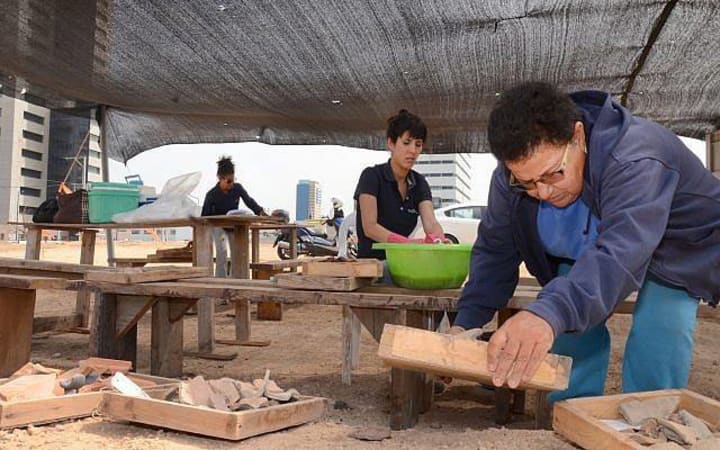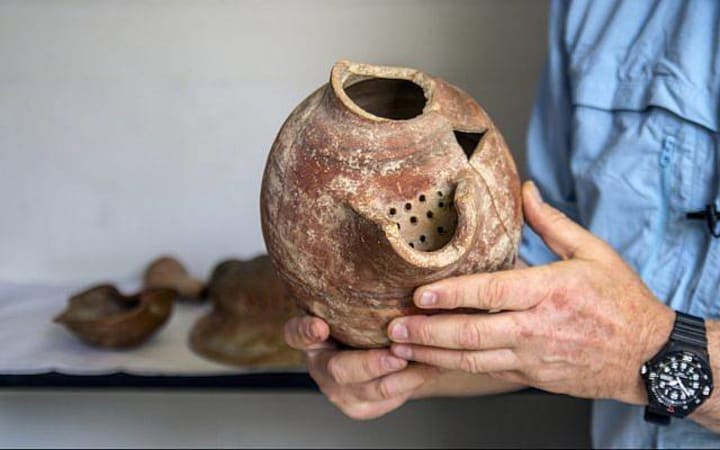Israeli Researchers Resurrect Biblical Beer Using 5,000-Year-Old Yeast
Beer
In an effort to expand the field of experimental archaeology, Israeli scientists were eager to brew the beer of our ancestors in order to better understand our past.

Upon successfully brewing beer from thousands-year-old strains of yeast, the archaeologists, microbiologists, university researchers, and craft brewers celebrated with a drink.
When Israeli scientists discovered yeast remnants in ancient clay shards across several archaeological sites in Israel, there appeared to be only one logical thing to do next: brew some seriously aged beer and mead.
These samples were found across nearly two dozen ceramic jars in Egyptian, Philistine, and Judean archaeological sites spanning from 3,000 B.C. to the 4th century B.C. From a salvage dig in Tel Aviv and a Persian-era palace in Jerusalem to a 5,000-year-old Egyptian brewery near the Gaza Strip, these bits of yeast were littered across the country.
According to Fox News, archaeologists and microbiologists from the Israel Antiquities Authority and four Israeli universities had initially partnered up to study these colonies of yeast. Now that same team has proudly announced that they’ve successfully “resurrected” these colonies.
This nascent field of experimental archaeology aims to bring tangible remnants from the past back to life in order to better study them. What better way to do so than to drink a few pints of the same swill our ancient ancestors did?
“Our research offers new tools to examine ancient methods, and enables us to taste the flavors of the past,” said Ronen Hazan of the Hebrew University School of Dental Medicine. “The greatest wonder here is that the yeast colonies survived within the vessel for thousands of years — just waiting to be excavated and grown,” Hazan continued. “This ancient yeast allowed us to create a beer that lets us know what ancient Philistine and Egyptian beer tasted like.”
To ensure these yeast samples didn’t go to waste after surviving thousands of years, scientists collaborated with a professional craft brewer in Jerusalem. They made a fairly basic ale — with a few modern additions like hops that weren’t available in the ancient Middle East — to keep things simple.

The Tel Aviv dig site on HaMasger street, from whence some of the yeast came.
“We tried to recreate some of the old flavors that people in this area were consuming hundreds and thousands of years ago,” said Shmuel Naky, brewer at the Jerusalem Beer Center. He explained that yeasts “have a very crucial impact on flavor.”
So what exactly does the beer of our ancient Middle Eastern ancestors taste like?
Naky described the beer as “spicy, and somewhat fruity, and it’s very complex in flavor.”
With a successful resurrection of the ale behind them, this partnership of scientists and curious craft brewers is planning on extending their capabilities even further. Next up, they said, was pairing using these revived yeasts and applying them to previously discovered ancient beer recipes.

Nearly two dozen ceramic vessels like this were uncovered across Israel, with salvageable strains of yeast within.
“By the way, the beer isn’t bad. Aside from the gimmick of drinking beer from the time of King Pharaoh, this research is extremely important to the field of experimental archaeology — a field that seeks to reconstruct the past,” Hazan added.
Who knows? Perhaps someday soon, they’ll produce a Hearty Horus or Sour Nefertiti.
About History of the Beer
The intoxicant known in English as `beer' takes its name from the Latin `bibere' (by way of the German `bier') meaning `to drink' and the Spanish word for beer, cerveza' comes from the Latin word `cerevisia' for `of beer', giving some indication of the long span human beings have been enjoying the drink.
Even so, beer brewing did not originate with the Romans but began thousands of years earlier. The Chinese brewed a type of beer but the product which became the most popular is credited to the Sumerians of Mesopotamia and most likely began over 10,000 years ago. The site known as Godin Tepe (in modern-day Iran) has provided evidence of beer brewing c. 3500 while sites excavated in Sumer suggest an even earlier date based on ceramics considered the remains of beer jugs and residue found in other ancient containers. Even so, the date of c. 4000 BCE is usually given for the creation of beer.
Behind every great civilisation is a great brew. Inspired by the ingredients and methods of the world’s first breweries, Anciv Brewing’s beers offer a modern twist on our ancient past.
The craft of beer brewing traveled to Egypt through trade and the Egyptians improved upon the original process, creating a lighter product that enjoyed great popularity. Although beer was known afterwards to the Greeks and Romans, it never gained the same kind of following as those cultures preferred wine and thought of beer as a "barbarian" drink. One of the many peoples they regarded as "barbarians" - the Germans - perfected the art of brewing and created what is recognized today as beer.
About the Creator
NORDX
Im a writer who like write about intersting things
Enjoyed the story? Support the Creator.
Subscribe for free to receive all their stories in your feed. You could also pledge your support or give them a one-off tip, letting them know you appreciate their work.






Comments
There are no comments for this story
Be the first to respond and start the conversation.